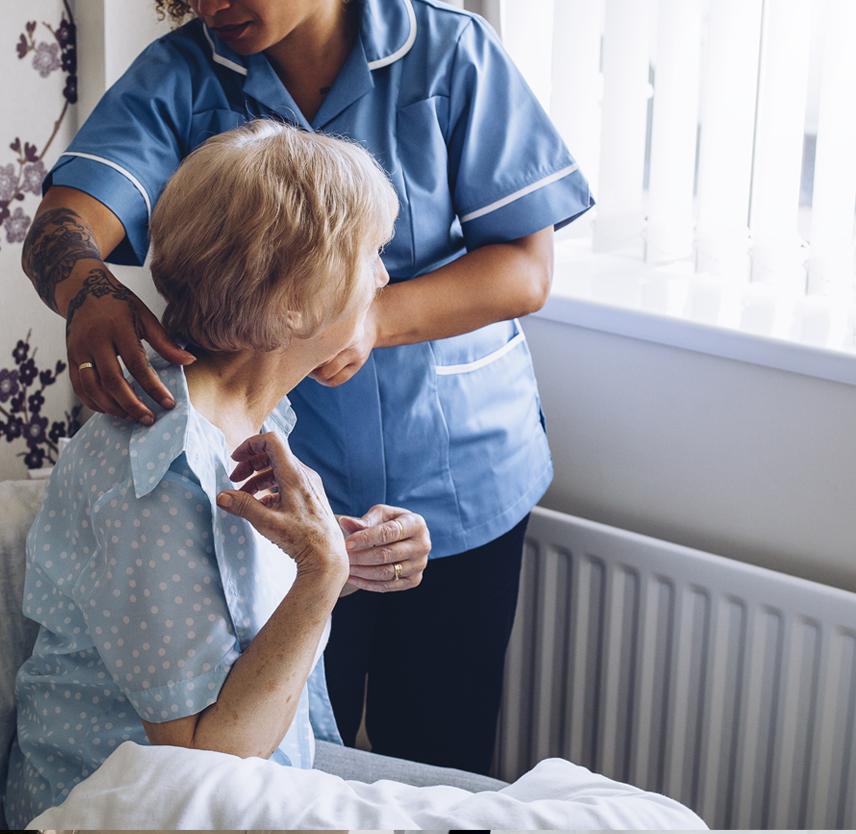
If your survivor is not yet ready for rehabilitation, but no longer requires the special care of an acute hospital, your health insurer will no longer pay the hospital bill. In this situation, you have three options:
- You can pay the bill yourself, if a bed is available.
- You can care for your patient at home, but this is a demanding job that requires medical skills.
- You can place your loved one in a long-term care facility, such as a nursing home, until she’s ready for rehabilitation.
Given that some nursing homes provide substandard care and most have little expertise in brain injury, this can be a chilling prospect.
According to one study, an estimated twenty to thirty percent of people hospitalized with a moderate or severe traumatic brain injury are discharged to nursing homes. Within one year, eighty percent of these survivors move to a private home, a community-based residence, an assisted living facility, or a rehabilitation hospital.
Federal and state government agencies monitor the country’s approximately 17,000 nursing homes. They compile service quality information in such areas as accurately administering medications, preventing abuse or neglect, improperly using restraints, and failing to prevent or properly treat bedsores. While this information paints an incomplete picture of service quality, it will help you weed out the worst offenders.
The folks who administer Medicare (800-633-4227 & www.medicare.gov) have a service called Nursing Home Compare, which provides detailed information about the past performance of every Medicare- and Medicaid-certified nursing home. Each nursing home is rated on a one-to five-star system to help you compare facilities and identify areas for closer scrutiny. There are ratings in three areas: health inspections, staffing, and ten quality measures. You can learn more about this system at www.cms.hhs.gov.
Additional information on nursing homes is available from the following organizations:
- The American Association of Homes and Services for the Aging (202-783-2242 & www.aahsa.org)
- Your state’s Office of Elder Affairs
- Your state’s Office of Health Care Administration
The best way to evaluate a nursing home is to visit it regularly, sometimes with an appointment and sometimes without. It’s also best to visit at varying times throughout the day and evening. During these visits, talk to everyone, including staff, residents, and visitors. If you feel ill at ease, you may want to look elsewhere.
Nursing homes are not the best environment for a person with a serious brain injury. If you have no other options, make the best of the situation by heeding these nine suggestions:
- Provide the staff with short, easy-to-read material on the basics of brain injury, perhaps portions of this book.
- If necessary, teach the staff how best to treat your loved one.
- Be vigilant. Visit often. An overworked staff will be more likely to treat your survivor well if they know you are watching.
- If your survivor is not getting the care she needs, keep detailed notes and take photographs to bolster your argument that she needs more attention.
- Arrange for therapy, even if it’s just range-of-motion exercises, from either in-house staff or outside therapists.
- Remember, your objective is to have your loved one moved to a rehabilitation facility as soon as possible.
- Stay in touch with the rehabilitation facility you have selected for your patient.
- Be sure the attending physician and therapists document even the slightest progress in your survivor’s condition.
- Be sure a professional with specialized training in brain injury recovery examines your patient regularly to determine if she’s ready for rehabilitation.
Finally, paying for nursing home care can become an issue if your survivor does not have long-term care insurance and does not qualify for Medicaid. Your health insurer will pay the bills only if your patient is regaining function.
This article on rehabilitation after a brain injury is excerpted from Garry Prowe's book, Successfully Surviving a Brain Injury: A Family Guidebook.
In 1997, Garry's wife, Jessica, sustained a severe brain injury in an automobile crash. "At the time, I spent way too much time accumulating the information I needed, not only to understand the medical aspects of Jessica's brain injury, but also to handle the myriad insurance, financial, legal, personal, and family issues that accompany a serious blow to the brain. I recognized the need — that still exists today — for a book that comprehensively addresses the wide variety of issues families face in the first few months after a brain injury.
"To research this book, I assembled a panel of more than 300 survivors, caregivers, and medical professionals who responded to my email questions and reviewed portions of my writing.
"For us, this project is a labor of love. All profits from the sale of this book will be donated to brain injury organizations."
From Sucessfully Surviving a Brain Injury: A Family Guidebook by Garry Prowe, Brain Injury Success Books, © 2010 Garry Prowe. Used with permission. www.BrainInjurySuccess.org.
